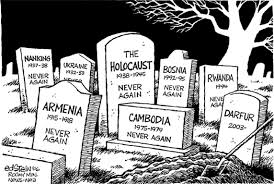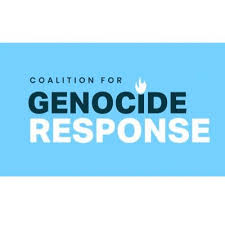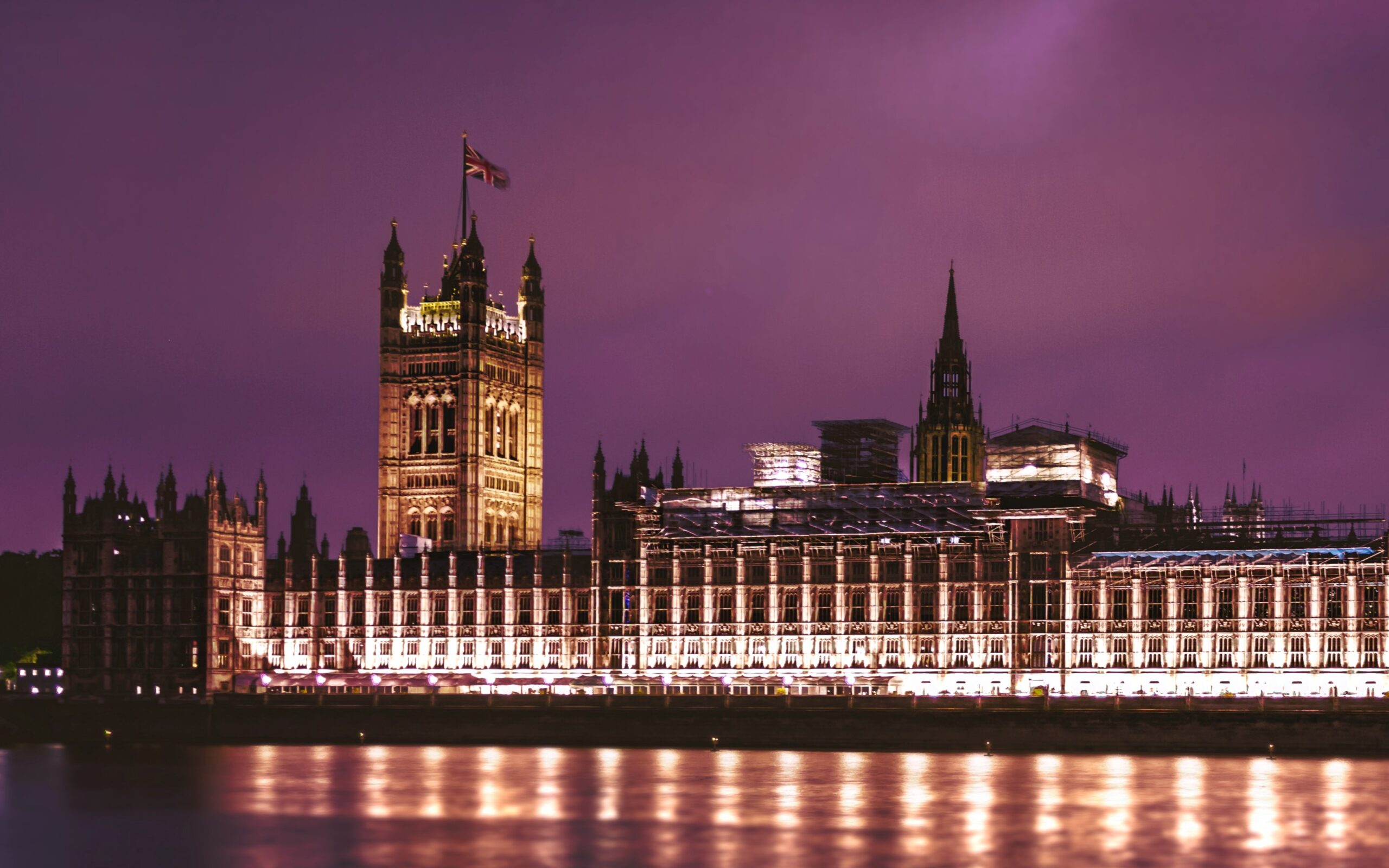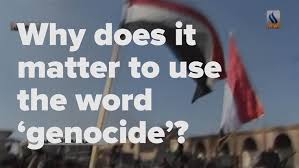
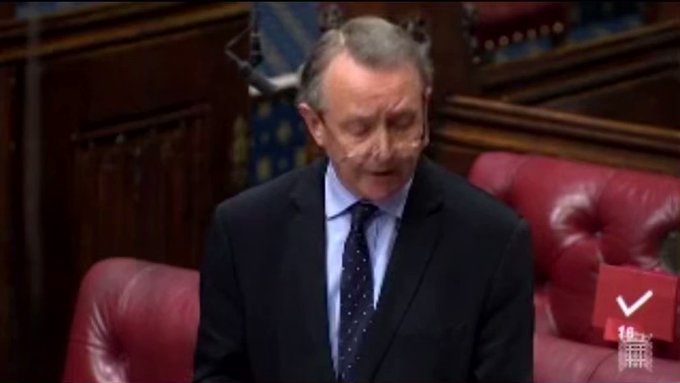
https://hansard.parliament.uk/lords/2020-10-13/debates/EE70A907-14EC-4EFE-8833-CE1F2FE82580/TradeBill
Lord Alton of Liverpool
68: After Clause 2, insert the following new Clause—
“Agreements with states accused of committing genocide
Regulations made under section 1(1) or section 2(1) are revoked if the High Court of England and Wales makes a preliminary determination that they should be revoked on the ground that another signatory to the relevant agreement has committed genocide under Article II of the United Nations Convention on the Prevention and Punishment of the Crime of Genocide, following an application to revoke the regulations on this ground from a person or group of persons belonging to a national, ethnic, racial or religious group, or an organisation representing such a group, which has been the subject of that genocide.”Member’s explanatory statement
The purpose of this amendment is to nullify trade arrangements made under this Bill if the High Court of England makes a preliminary determination that they should be revoked on the ground that the proposed trade partner has perpetrated Genocide.
Lord Alton of Liverpool (CB)
My Lords, we come now to Amendments 68 and 76A, which are being taken together. Amendment 76A supersedes Amendment 68 and takes into account remarks made by the Minister, the noble Lord, Lord Grimstone, when we debated Amendment 33 on 29 September. I am grateful to the Minister for meeting the noble Lord, Lord Blencathra, and me yesterday at a meeting attended by another Minister, Greg Hands MP, and Sir Iain Duncan Smith MP, but I also thank my noble friend Lady Falkner of Margravine and the noble Lords, Lord Adonis and Lord Forsyth, for being co-sponsors, and all noble Lords who will either speak today or who have indicated their willingness to support the proposition at later stages.
Thanks, too, to the founders of the Coalition for Genocide Response, Luke de Pulford and Ewelina Ochab, for their valiant efforts in driving this on. Particular thanks, though, to Members of another place for their supportive, bipartisan references to the amendment in their recent Westminster Hall debate entitled “China: Labour Programme in Tibet” and yesterday’s debate on Uighurs. The former leader of the Conservative Party, Sir Iain Duncan Smith, told the House that
“should such a new clause come to the Commons, I will absolutely support it”.—[Official Report, Commons, 7/10/20; col. 119WH.]
In yesterday’s debate, triggered by 100,000 signatures sent in a petition to Parliament, Shabana Mahmood MP said that she hoped that her colleagues on the opposition Front Bench would back the amendment. In parenthesis, I should mention that I am an officer of the All-Party Parliamentary Groups on Uighurs, Tibet and Hong Kong.
It was back in March 2016 that the noble Lord, Lord Forsyth, the noble Baroness, Lady Kennedy of The Shaws, my noble friend Lady Cox and other noble Lords strongly supported an amendment responding to the unfolding genocide against Yazidis and other minorities in northern Syria and Iraq. The noble Lord, Lord Forsyth, made a characteristically powerful intervention. The Government resisted the amendment and repeatedly told the House that genocide was a matter for the courts.
We did not leave it there, and the admirable Member for Congleton, Fiona Bruce MP, a lawyer, tabled a Motion in the Commons declaring those events to be a genocide, in line with the legal definition of genocide set out in the convention on the crime of genocide of 1948. Although the House of Commons passed it with overwhelming all-party support, the Government again resisted it, saying that only international courts could determine a genocide. This is a circular argument—indeed, a vicious circular argument.
The Government say that the International Criminal Court is the appropriate court of law, neglecting to add that a referral to it from the Security Council will almost always be resisted by the use of a veto by a permanent member. Does anyone seriously believe that the Chinese Communist Party would refer itself to the International Criminal Court to establish whether it had committed genocide in Xinjiang against Uighurs. Waiting for international institutions to act soundly is very commendable, but is a convenient fiction, especially for those who think it should just be business as usual.
What happens in this cycle of buck passing? Following the debate in 2016, it is estimated that 10,000 Yazidis were kidnapped or killed by Daesh, and approximately 3,000 Yazidi women and girls were forced into sexual slavery and are still missing. Many other minorities suffered similarly, as I heard and saw for myself when collecting evidence in northern Iraq a few months ago. For the past four years, Mrs Bruce and I have tabled genocide determination Bills to break the circle—and here, in this Bill, we have the opportunity to do just that.
So how would the provision work? During the debate in Committee on Tuesday 29 September, the noble Lord raised his concern that the continuity agreements do not involve trading partners who are most likely to be the most serious abusers of human rights, and that a country such as China would not have been within the scope of the amendment. However, with the help of the Public Bill Office, to which I am grateful, Amendment 76A takes those points into account and, in summary, nullifies trade arrangements made under the Bill if the High Court of England makes a preliminary determination that they should be revoked on the ground that the proposed trade partner has perpetrated genocide.
I particularly draw the attention of the Committee to the words that such deals would be revoked if
“another signatory to the relevant agreement or any future trading partner that has hitherto traded with the UK, regardless of whether they have a formal trade agreement, has committed genocide under Article II of the United Nations Convention on the Prevention and Punishment of the Crime of Genocide, following an application to revoke the regulations on this ground from a person or group of persons belonging to a national, ethnic, racial or religious group, or an organisation representing such a group, which has been the subject of that genocide.”
As for scope, the noble Baroness, Lady Chakrabarti, rightly insisted during the Committee proceedings last week that it is for Parliament, not government departments, to determine what falls within the scope of the Title of a Bill. Therefore, this amendment is in scope. However, another argument is now also being deployed. The amendment may be in scope, it says, but this is not the Bill in which to do it; this is not the right time or place. However, as Sir Iain points out, that is a standard line that he himself was told to deploy and use during all his years as a Minister. It is never the right time and never the right Bill.
This is a convenient moment to remind the House of the promise given by a government Minister at the Dispatch Box of your Lordships’ House at the conclusion of Report on the Telecommunications Infrastructure (Leasehold Property) Bill. Following speech after speech from all sides pointing to human rights violations in Xinjiang and the direct links of Huawei and the companies in supply chains that use slave labour, the Government agreed to rewrite an amendment on human rights violations and to bring it back at Third Reading. That Bill of course continues to be deferred, and it is no secret that the Government have been unable to draft the promised amendment. Hence, an opportunity is presented here for the Government to honour their promise and to use this vehicle not for the Christmas-tree purposes of hanging on it every issue under the sun but to meet an obligation entered into in Parliament and to act on an issue that enjoys bipartisan and bicameral support.
So how would this provision work in practice, and who might it affect? The key is that the court would decide whether there is enough evidence to justify a predetermination. The threshold is incredibly high. Furthermore, as my noble and learned friend Lord Hope of Craighead pointed out, if they so wished, the Government would have the right to have a contradictor present in the court to argue against such a predetermination. I thank my noble and learned friend for his invaluable advice, not least in pointing me to the High Court of England and Wales rather than the Supreme Court as the relevant body to make the predetermination.
Currently, the most obvious global contenders for predetermination are China and Burma for their crimes against Uighur and Rohingya Muslims. However, if state collaboration in countries such as Syria and Iraq against ethnic or religious minorities, such as the Yazidis, were proven, they too could fall within the terms of the amendment. However, we should be clear: the threshold is exacting, and the amendment will not stop any trade with any country until the High Court has made a preliminary determination that there is a prima facie case of genocide, with the Government able to deploy a contradictor in the court.
The crime of genocide—often described as the crime above all crimes—is carefully defined in the 1948 convention on the crime of genocide, to which the United Kingdom is a signatory. Article II of the convention states that
“genocide means any of the following acts committed with intent to destroy, in whole or in part, a national, ethnical, racial or religious group, as such:
(a) Killing members of the group;
(b) Causing serious bodily or mental harm to members of the group;
(c) Deliberately inflicting on the group conditions of life calculated to bring about its physical destruction in whole or in part;
d) Imposing measures intended to prevent births within the group;
(e) Forcibly transferring children of the group to another group.”
As a signatory to the convention, we are required to prevent genocide, to protect those affected by genocide and to punish those responsible. However, if no judicial authority declares a genocide to be under way, we are not obliged to act—hence the vicious circle.
The practical effect of that is illustrated by the Armenian genocide of 1914 to 1923. It is still unrecognised by the United Kingdom as a genocide. It involved the systematic mass murder and expulsion of 1.5 million ethnic Armenians carried out in Turkey and adjoining regions, and was referred to here in your Lordships’ House only yesterday in the context of the current unfolding events in Nagorno-Karabakh. In an intervention last week, I reminded the House of Hitler’s infamous remark as he prepared the Final Solution: “Who now remembers the Armenians?” In yesterday’s debate in another place, Siobhain McDonagh, the MP for Mitcham and Morden, movingly said of Xinjiang:
“If we look on, history will condemn our unforgivable cowardice and ask why those in power did not act.”—[Official Report, Commons, 12/10/20; col. 40WH.]
Increasingly, we might ask, “Who now remembers the Tibetans?”, and in the future will other perpetrators of genocide ask, “Who now remembers the Uighurs?”
Perhaps I may give another example of the vicious circle. The United Nations report into mass atrocities in North Korea, chaired by the eminent jurist Michael Kirby, a judge in Australia, described North Korea—a country I have visited, and I should declare that I am a co-chair of the All-Party Parliamentary Group for North Korea, which I founded—as “a state without parallel”. The report called for North Korea to be referred to the International Criminal Court. It has never happened because this of course would require a referral by the United Nations Security Council, where China would use its veto.
What sort of evidence would be laid before the High Court to short-circuit the vicious circle and to upend the impotence to which the cynical misuse of the veto and the subversion of United Nations agencies has led? During the debate on Amendment 33, we heard allegations from the noble Lord, Lord Hunt of Kings Heath, about forced organ harvesting in China, targeting Falun Gong practitioners. We have heard many accounts from Xinjiang of forced labour, the removal of people from their homes and villages, the creation of what the noble Lord, Lord Adonis, described as concentration camps, the prevention of births, and the destruction of cemeteries, identity and culture. There are almost 400 prison camps in Xinjiang and more are being built. The Muslim faith and culture, language and identity are being obliterated and a surveillance state enforces compliance.
6.15 pm
In August, the President of the Board of Deputies of British Jews stated in a letter to the Chinese Ambassador:
“The World will neither forgive nor forget a genocide against the Uighur people”,
noting
“the similarities between what is alleged to be happening in the People’s Republic of China today and what happened in Nazi Germany 75 years ago”.
Having seen a video of shackled and blindfolded Uighur Muslims being led from trains to camps, Dominic Raab said this is
“reminiscent of something not seen for a long time.”
Professor Adrian Zenz, a German scholar, describes it as
“the largest detention of an ethno-religious minority since World War II”,
while Joanne Smith Finley, a Newcastle University academic, has described what she calls
“a slow, painful, creeping genocide.”
The United Nations Committee on the Elimination of Racial Discrimination has described the region as
“a massive internment camp shrouded in secrecy, a ‘no rights zone’, while members of the Xinjiang Uyghur minority, along with others who were identified as Muslim, were being treated as enemies of the State based on nothing more than their ethno-religious identity.”
I urge noble Lords to read the harrowing testimony of Mihrigul Tursun, a Uighur who managed to escape, who says:
“Each time I was electrocuted, my whole body would shake violently, and I could feel the pain in my veins. I thought I would rather die than go through this torture and begged them to kill me.”
There are increasing reports of Uighurs being subjected to DNA tests, and there is significant suspicion that they have been targeted for forced organ donation and biometric surveillance.
Sir Geoffrey Nice QC, in the final judgment of his independent tribunal into forced organ harvesting in China, concluded:
“Forced organ harvesting has been committed for years throughout China on a significant scale … Falun Gong practitioners have been one—and probably the main—source of organ supply … crimes against humanity against the Falun Gong and … Uyghur … had … been proved beyond reasonable doubt”.
On 6 October, 39 countries issued a joint statement on the human rights situation in Xinjiang at the United Nations General Assembly Third Committee, stating
“We are gravely concerned about the human rights situation in Xinjiang”.
A report published last week by the US Department of Labor detailed the list of goods produced by forced labour and child labour. It described the appalling conditions and indoctrination endured by over 1 million Uighurs and said that the “vast scale of abuse” must
“serve as a notice for the world to ask questions, take action, and demand change.”
Shockingly, western fashion brands and big-name companies simply turn a blind eye. In a call this morning with Sophie Richardson of Human Rights Watch, who is based in Washington, she told me that over 400 members of the House, from across the political divide—extraordinary given the toxicity often of US politics—had come together to insist on a rebuttable presumption on goods from China, requiring companies to demonstrate that they had not been manufactured by slave labour.
I was glad to hear the noble Lord, Lord Ahmad of Wimbledon, insist last week that
“The UK is committed to the principle that there must be no impunity for perpetrators of genocide”.
He is right: there must be no impunity, but no lucrative trade deals either. Genocide should be bad for business, but it has not been in the past and it is not now. Think of Nazi slave labour and beneficiaries such as IBM and Volkswagen, which even built a labour camp next to one of its factories to ensure a supply of labour. Think of Hugo Boss, Kodak and Siemens; Siemens even ran factories inside concentration camps, including at Auschwitz, Buchenwald, Ravensbrück and Sachsenhausen. Extermination through labour: what is happening to the Uighurs and others is comparable.
To summarise and conclude, Amendments 68 and 76A do not take a blunderbuss approach but are carefully designed to hit a target. They could not easily be used in trivial or vexatious cases. They are a proportionate response to a monstrous crime. They build on the almost unanimous support of Peers for such a threshold, expressed on Report on the telecommunications infrastructure Bill, and would therefore enable the Government to honour their promise, given during that debate, to find a suitable legislative vehicle to take the matter forward.
I have no doubt that the Minister shares my abhorrence and that of other noble Lords. I hope that even though he will feel duty-bound to resist many amendments to the Bill, he will recognise the unique nature of this amendment and will, between now and Report, work with the movers to incorporate it into the legislation. I beg to move
———
Liverpool.
7.15 pm
Lord Alton of Liverpool (CB)
My Lords, first, I thank the Minister for the way in which he has addressed the Committee, but also for the time he has given, not just yesterday but at previous meetings, and throughout the discussions we have had so far. I know that he is trying to be constructive about this. I know that he would rather it were not in this Bill but he speaks for the entire Government, not just the silo of the Bill or his own department, when he addresses your Lordships’ House. I remind him of what I said earlier specifically about the undertakings that his own Government gave from that same Dispatch Box that an amendment would be crafted in response to the telecommunications infrastructure Bill. That has been addressed in neither the Minister’s reply nor the correspondence I have had with him and other departments involved in this. Indeed, at a previous meeting, not only was the Department for International Trade represented but the DCMS, Home Office and Foreign Office. I have done my best to try to weave this across government departments and to get a response from all the Ministers involved.
We have an opportunity inside this legislative vehicle. I will not pretend that I have the skills or the ability to craft amendments in ways that overcome the bureaucratic hurdles that the Minister referred to a few moments ago. I was pleased to hear the noble Lord, Lord Stevenson, say that he thought this was an innovative use of the courts. The noble Baroness, Lady Smith of Newnham, talked about this as being a different way of approaching the issue. Others have talked about the astute nature of the amendment in trying to navigate these difficult waters.
When the Minister says that he has unequivocal opposition to genocide in all its forms and that is the Government’s position, I do not doubt that. I applaud it. I referred earlier to the remarks of the noble Lord, Lord Ahmad of Wimbledon, and the unequivocal stand that he has taken on these issues. But the question for me, therefore, is: what can we do about it? It is almost as though the spirit—the shadow—of Raphael Lemkin has been here throughout the debate. My noble friend Lady Falkner was the first to mention Lemkin, but so did the noble Baroness, Lady Deech, and others. Raphael Lemkin lost 49 of his relatives—49 people were murdered in the Holocaust who were direct relatives of his—and coined this word: genocide. It is not a word to be used lightly. Again, I think it was the noble Baroness, Lady Smith, who made this point, rightly: it is not hyperbole. This is a word that should be used only in very extreme circumstances. That is why the amendment is crafted to do precisely that.
It is interesting that the Minister said that this was not a political decision but a judicial one. In my correspondence with the noble Baroness, Lady Noakes, this is an area about which we have disagreed because she herself has said that she thinks it should be a political decision. But the Government’s position is that it is a judicial one. Yet this gets us into the vicious circle I described earlier, where there is no competent court because of the vetoes used to prevent it being dealt with at an international level.
That takes me to the remarks of my noble and learned friend Lord Hope of Craighead. We were treated to an extraordinary, spellbinding and authoritative description by someone of huge standing. He told us at the conclusion of his remarks that this amendment will achieve its objective. However, he said that if refinement is necessary, he hopes that the Government will be willing to participate in providing it between now and Report. He said that it provides due process in accordance with the rule of law, and throughout the debate other noble Lords have commented on the importance of the rule of law in these circumstances. He also said that this is a very serious matter and that we have provided a mechanism in the amendment to tackle it. My noble and learned friend is a very wise man with huge judicial experience, and I hope that the Committee will take due note of what he said.
Everyone who has participated in the debate has made a valuable and interesting contribution. The noble Lord, Lord Judd, talked about the immense inhumanity and suffering experienced by so many people, and he said that it should be written into the DNA of all our trade agreements that we should act accordingly when doing business. As others have done, he talked about the importance of our values and where they stand in the world. The noble Lord, Lord Forsyth, reminded us that business has a duty to ensure that it does not profit from genocide. The noble Baroness, Lady Deech, said that morality and trade must walk hand in hand, and that we must hit where it hurts. My noble friend Lady Falkner reminded us not only of the origins of the word “genocide” but its implications in the way that we proceed in trying to deal with it.
The noble Lord, Lord Sheikh, said that the amendment would send a clear message. He talked about its symbolic importance and the creation of precedence. The noble Baroness, Lady Northover, reminded us of the manipulation of international bodies. She specifically referred to the Human Rights Council, where even today more votes are taking place on its membership. It seems rather like the burglar and the watchdog becoming one and the same thing when China has such a leading role in an organisation of that kind.
I will conclude in a moment. The noble Lord, Lord Stevenson, said that there are other egregious offences that we might also wish to deal with. I simply say to him that, if that were possible, I wish that we would. However, the man who tries to go everywhere ends up going nowhere, and the man who tries to catch every hare ends up catching none.
The amendment is carefully drafted for a specific and particular purpose, which is to try to catch those who have been responsible for the kinds of genocides that we have heard about—the historic genocides that have been mentioned in the debate and those being perpetrated in the world today. Yet, in the end, my view is that the stories will not determine events. If the amendment were agreed, the High Court of England and Wales would decide whether there was a case to be answered. In those circumstances, it would trigger the removal of the agreements that had been entered into, whether they were past agreements or not. Therefore, I remind your Lordships to look again at the wording of the recast amendment, which was drafted after listening very carefully to what the Minister said at an earlier stage.
I hope that, as we go away from the debate tonight, we will see this as the beginning of a continuing discussion with the Government. The Minister should surely see the political realities after hearing the spokesmen for the Official Opposition and the Liberal Democrats and people from the Cross Benches, and, perhaps even more importantly from his point of view, voices such as those of the noble Lords, Lord Forsyth and Lord Blencathra, and the right honourable Iain Duncan Smith MP, who is willing to co-sponsor this amendment in the House of Commons if it is incorporated into the Bill. Having seen and heard some of those realities, I hope that the Government will now work with us to iron out any imperfections in the amendment and to bring it back on Report in a better form. On that basis, I beg leave to withdraw the amendment.
Amendment 68 withdrawn.
Amendment 69 not moved.
7.23 pm
Sitting suspended.
